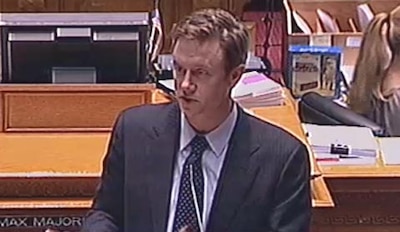Updated April 2 – The Senate Tuesday morning gave 20-15 final approval to the bill that would rewrite Colorado’s school finance system, a plan that will go into effect only if voters later approve a tax increase to pay for it.

This morning’s final debate distilled Monday’s lengthy discussions, with Republicans attacking the proposed tax increase required by the bill and questioning whether the measure contains any educational reform.“What is behind Senate Bill 213,” said Sen. Mark Scheffel, R-Parker, “is a tax increase.”
“This bill keeps us in the previous century.” Said Sen. Owen Hill, R-Colorado Springs. Instead, he suggested, “Let’s give everyone of a children a backpack full of money” they can use to choose the schools they want.
“This is not reform, this is a billion dollar tax increase,” argued Sen. Scott Renfroe, R-Greeley.
Sen. Rollie Heath, D-Boulder, struck back forcefully at the reform criticism, saying, “We have passed the toughest reform package in this country,” citing the standards and testing, district and school accountability, educator evaluation and early literacy laws passed in the last five years. Heath, a prime sponsor of SB 13-213, said they bill and its funding are needed to bring those reforms to life.
Sen. Vicki Marble, R-Fort Collins, called the bill a “fairy tale” and indicated the best education reform would be private tuition tax credits. (Two Republican bills on that subject were quickly killed earlier in the legislative session.)
All 20 senate Democrats supported Senate Bill 13-213, and all 15 Republicans voted no. The measure now moves to the House for consideration.
Text of Monday story follows.
Sen. Mike Johnston Monday got the amendments he needed on his 174-page bill to modernize Colorado’s school funding system, but he didn’t get any love from Republicans who don’t like the $1 billion price tag.
The Senate approved Senate Bill 13-213 on a 20-15 preliminary vote, which is expected to be the same party-line total when a final vote is taken later.
As the bill headed into the Senate Education Committee last month, Johnston’s problems were with a fellow Democrat and with some large school districts that were unhappy with the amounts of money they’d receive under Johnston’s original formula.
The bill would increase funding for kindergarten and preschool, provide significantly more money for districts with the highest concentrations of at-risk students and English language learners, devote more money to special education and make extra payments to districts for the cost of implementing reform mandates.
Because the Colorado constitution requires tax increases be approved by voters, the funding piece of the proposal would have to be passed in a statewide election.
Before the Senate Education Committee passed the bill on March 21, Sen. Nancy Todd, D-Aurora, added an amendment that set “floor” per-pupil funding of about $7,495 for every district. That was intended to assuage the concerns of several large suburban districts. (See this article about the committee meeting.)
The trouble was that Todd’s amendment ballooned the bill’s estimated cost to about $1.3 billion, something Johnston wasn’t willing to accept.
Negotiations led to a compromise that was presented on the Senate floor Monday. That amendment reduces district floor funding to about $7,022 per pupil but also increases special education funding, a move that would help districts because more state special ed support would reduce the amounts that districts have to backfill from their main budgets. (Current average per-pupil funding is $6,872.)
The amendment also would reduce to $441 the per-student amount that districts would receive from SB 13-213’s Teaching and Leadership Investment fund, which is intended to provide districts with extra funding to implement the costs of state reform requirements passed in recent years. Johnston’s original bill set the figure at $600.
Johnston explained that every district would take a $141 cut, but some districts would receive that money back to fund them at the floor level.
The effect of the amendment is to bring the bill’s cost back to a level that Johnston is comfortable with – and which he and supporters hope voters will support.
Todd told EdNews she thinks most of the concerned districts are “okay” with the bill as amended Monday but said she thinks the issue of floor funding may come up again once the bill moves to the House.
Republicans weren’t happy

Johnston, a Denver Democrat, has successfully allied with Republicans on past school reform measures, most notably Senate Bill 10-191, which created a teacher and principal evaluation system based partly on student academic growth.
But Monday’s debate on SB 13-213 showed a hard partisan split similar to that seen this session on such non-education issues as gun control.
The measure received no Republican votes when it passed Senate Education. GOP senators expanded on their opposition Monday during a debate that stretched from 11 a.m. to 5 p.m., with Republicans doing most of the talking during the later stages. Sen. Pat Steadman, who chaired the session, noted that it was a “long and languid” debate.
Republicans proposed 21 amendments, and tried six more (including some repeats) at the end of the discussion, as is allowed on preliminary consideration. All were defeated or ruled out of order.
Objections boiled down to three complaints – the bill is too expensive, the school finance system is too complicated and the bill doesn’t really provide education reform.
“This is a bill of special interests who have put together what they want to do to get a billion tax increase,” said Sen. Scott Renfroe, R-Greeley. He’s the ranking minority member of the Senate Education Committee and led the GOP floor fight against SB 13-213. “It funds basically the same system with a few tweaks at a much higher amount.”
Sen. Ted Harvey, R-Highlands Ranch, said, “You don’t see much in the way of reform in this bill. If this is being labeled as education reform, it’s April Fool’s Day.”
In the end, Republican senators argued for school choice and for replacing the bill with tax credits for private school tuition. (Speakers managed to avoid using the word “vouchers” throughout the debate.)
